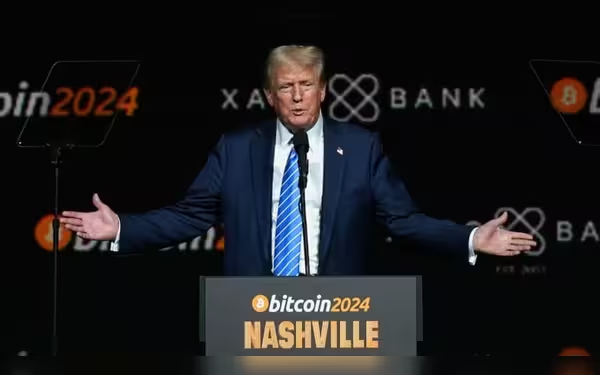Thursday, November 7, 2024 03:37 AM
Trump Trades Resurface as U.S. Election Approaches
- Financial markets react to Trump's potential election victory.
- Bitcoin and small-cap stocks see significant gains.
- Mexican peso declines amid tariff threats from Trump.
 Image Credits: channelnewsasia
Image Credits: channelnewsasiaAs the U.S. election nears, financial markets react to Trump's potential victory, impacting bitcoin, small-cap stocks, and the Mexican peso.
As the U.S. presidential race heats up, financial markets are once again reacting to the potential implications of a Donald Trump victory. With less than three weeks until Election Day, various assets, including small-cap stocks and bitcoin, have seen a rise, while the Mexican peso and U.S. Treasuries have experienced a decline. This shift in market dynamics mirrors the so-called "Trump trades" observed earlier this year when Trump briefly led in polls against President Joe Biden.
Recent polling data indicates a tight race, with Vice President Kamala Harris leading Trump by a narrow margin of 45 percent to 42 percent, according to a Reuters/Ipsos poll. This tightening of the race has led to increased activity in online prediction markets, where Trump has gained an edge. However, investors are cautious about attributing these market movements solely to Trump, as they may also reflect a broader sense of economic optimism following a strong U.S. jobs report and a recent interest-rate cut by the Federal Reserve.
Among the notable gainers in the market are shares of Trump Media & Technology Group, which have closely followed Trump's fortunes in polls and prediction markets since their listing. Steve Sosnick, chief strategist at Interactive Brokers, noted, "It’s the trade that is most levered to Trump’s election prospects." Additionally, private prison operators like Geo Group and CoreCivic have seen their shares rise significantly, as Trump's promises to crack down on illegal immigration could increase demand for detention facilities.
The small-cap-focused Russell 2000 index has also shown resilience, climbing 4 percent since October 10, as investors anticipate that Trump will maintain low taxes and reduce regulations, benefiting smaller companies. In the foreign-exchange markets, the dollar's rebound against various currencies, particularly the Mexican peso, is evident. The peso has dropped 4 percent from its September high, as it is perceived to be vulnerable to potential tariffs that Trump has threatened to impose.
Trump's economic policies are generally viewed as favorable for growth and inflation, which could lead to higher Treasury yields. The dollar index, which measures the strength of the U.S. dollar against six major currencies, has risen over 3 percent since late September, reflecting investor confidence in a potential Trump victory.
Interestingly, the cryptocurrency market is also feeling the effects of Trump's improved standing in prediction markets. Bitcoin has surged 12 percent since October 10, with analysts suggesting that if Trump secures a second term, the regulatory risks associated with cryptocurrencies could diminish significantly.
In the realm of government bonds, some investors believe that Trump's rising popularity has contributed to an increase in the 10-year term premium, indicating concerns about potential budget deficits resulting from his tax proposals. A recent gauge from the New York Fed showed a positive term premium for the first time since July, coinciding with a broader rise in Treasury yields.
Despite these market movements, not all analysts view them as definitive bets on a Trump victory. Some, like Sonu Varghese from Carson Group, argue that the election remains uncertain, emphasizing that the underlying narrative is one of stronger economic growth and a supportive Federal Reserve.
As the U.S. presidential election approaches, the financial markets are once again reflecting the potential impact of a Trump presidency. While certain assets are rising and others are falling, the overall sentiment appears to be influenced by a combination of political developments and economic indicators. Investors should remain vigilant and consider the broader economic context as they navigate these turbulent waters.













